Master the Art of Follow-up Letters for Job Interviews with a Comprehensive Collection of 23 Templates
Welcome to our Job Interview Follow-up Letters website! We understand that the post-interview phase is crucial in making a lasting impression on potential employers. That’s why we’re here to provide you with a comprehensive resource that goes beyond just templates. Our website is designed to equip you with valuable guidance, tips, and strategies to create personalized, professional, and impactful follow-up letters. Whether you’re expressing gratitude, addressing concerns, or showcasing your qualifications, our goal is to help you navigate this important step with confidence and increase your chances of success. Get ready to elevate your job search with our expert advice and resources.
Follow-up Letter Etiquette
- Proper Salutations: Address the recipient of the follow-up letter using a professional salutation such as “Dear [Interviewer’s Name]” or “Dear Hiring Manager.” Avoid using informal or generic greetings like “Hi” or “To Whom It May Concern.”
- Polite and Professional Tone: Maintain a polite and professional tone throughout the letter. Use courteous language, avoid slang or jargon, and express gratitude for the opportunity to interview. Keep the tone positive, confident, and sincere.
- Clear and Concise Formatting: Use clear and concise formatting to make the letter easy to read and navigate. Use paragraphs to organize your thoughts and ensure that the content flows smoothly. Use a professional font and standard font size. Proofread the letter carefully to eliminate any spelling or grammatical errors.
- Professional Closing: End the letter with a professional closing such as “Sincerely,” “Best regards,” or “Thank you.” Follow the closing with your full name and contact information. Maintain a professional signature, either by signing the letter if it is printed or using a digital signature for email or online submissions.
- Timeliness: Send the follow-up letter within 24 to 48 hours after the interview to demonstrate promptness and interest. Delaying the follow-up for too long may diminish its impact and relevance.
- Personalization: Customize the follow-up letter to reflect the specific details discussed during the interview. Refer to specific points, conversations, or shared experiences to show your attentiveness and engagement during the interview process.
- Proofreading: Before sending the follow-up letter, carefully proofread it for any spelling, grammar, or formatting errors. Typos or mistakes can reflect poorly on your attention to detail and professionalism. Consider having a trusted friend or family member review the letter as well.
#1: Thank You Letter:
Expressing gratitude for the opportunity to interview and reiterating your interest in the position. A thank you letter serves as a professional and courteous way to express gratitude for the opportunity to interview for a position. It allows you to show appreciation to the interviewer for their time and consideration while also reiterating your interest in the position. This letter is an opportunity to leave a positive and lasting impression, demonstrating your professionalism and enthusiasm for the role. It also provides an additional chance to highlight relevant qualifications and express your eagerness to contribute to the company’s success. Overall, a thank you letter helps to strengthen the employer’s perception of you as a candidate and keeps you top-of-mind during the hiring process.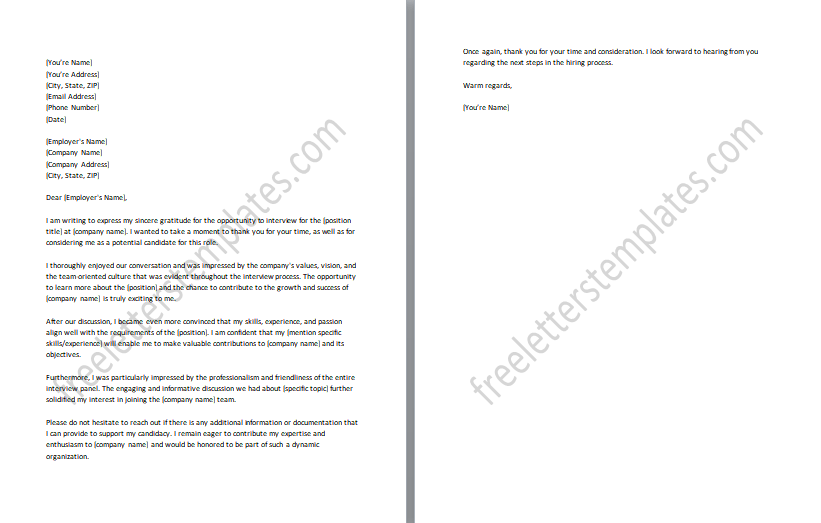
#2: Post-Interview Recap Letter:
Summarize key points discussed during the interview and highlight your qualifications. A post-interview recap letter serves as a professional follow-up to summarize the key points discussed during the interview and highlight your qualifications. This letter allows you to reinforce your interest in the position and showcase your understanding of the company’s needs and how your skills align with them. By providing a concise recap of the interview, you demonstrate your attention to detail and effective communication skills. Additionally, you can use this opportunity to address any additional information or insights that may further support your candidacy. The post-interview recap letter helps to reinforce your qualifications and keep you at the forefront of the interviewer’s mind as they make their hiring decision.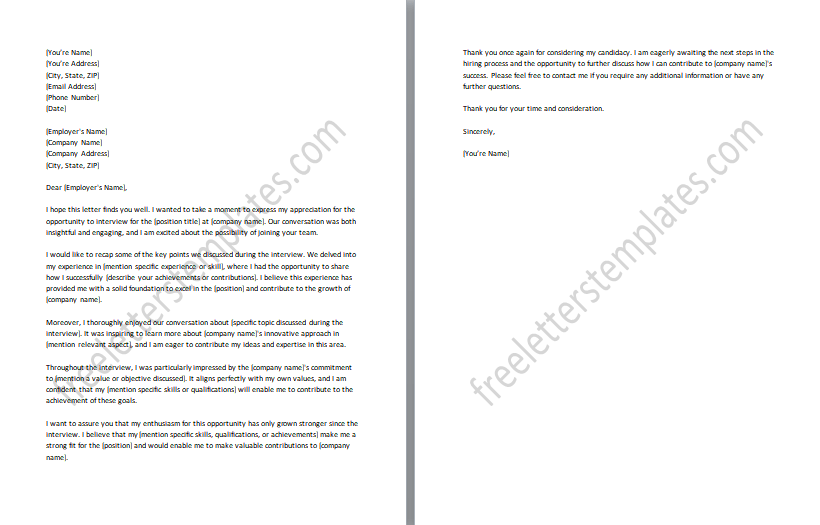
#3: Additional References Letter:
Providing additional references or testimonials from colleagues or supervisors. An additional references letter is a formal way to provide additional references or testimonials from colleagues or supervisors to further support your candidacy. By including these references, you provide the employer with valuable insights into your work ethic, skills, and character from trusted sources. The additional references letter strengthens your application by offering a broader perspective on your qualifications and reinforces the positive impression you made during the interview process. It demonstrates your commitment to excellence and provides the employer with further assurance of your potential as a valuable asset to their team.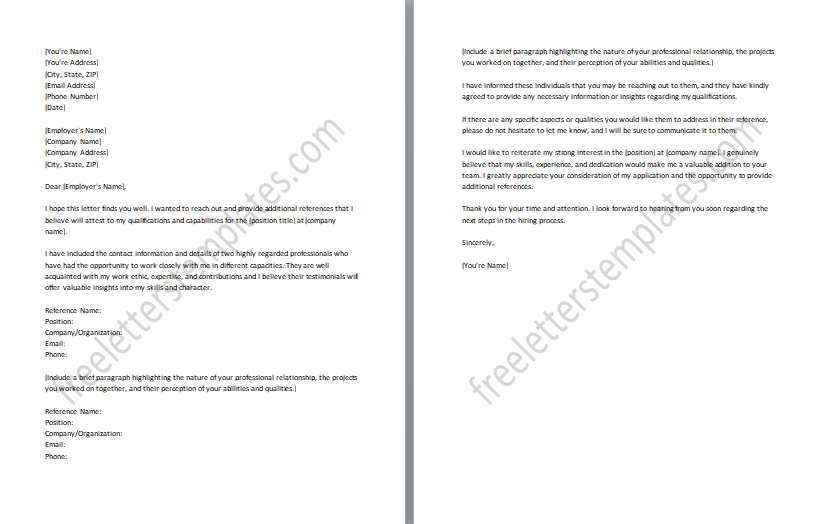
#4: Project Proposal Letter:
Submitting a detailed project proposal related to the position to showcase your skills and initiative. A project proposal letter serves as a comprehensive document that outlines a detailed project proposal related to the position you are applying for, showcasing your skills and initiative. This letter provides an opportunity to present a clear and strategic plan for addressing a specific challenge or opportunity within the organization. The project proposal letter allows you to showcase your expertise, highlight your qualifications, and present yourself as a proactive and innovative candidate who is ready to make a significant impact. By providing a well-structured and compelling project proposal, you can differentiate yourself from other candidates and demonstrate your potential value to the organization.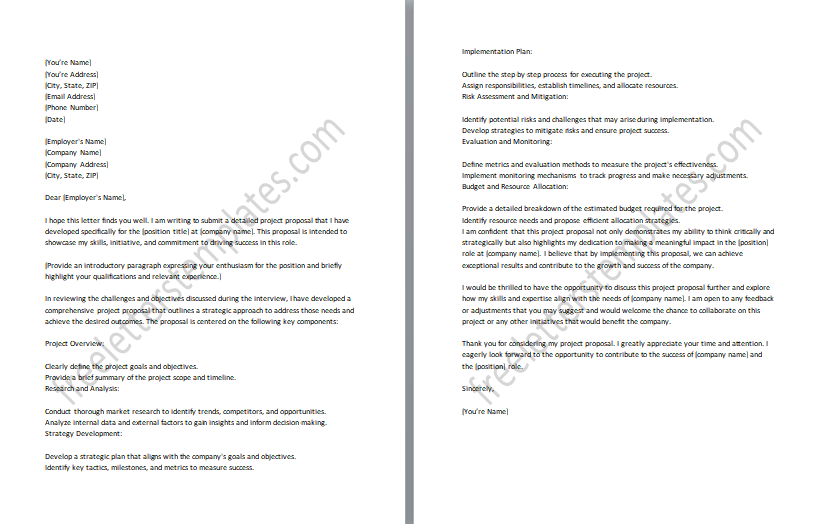
#5: Portfolio Showcase Letter:
Sharing a portfolio of your work or relevant projects to further demonstrate your capabilities. A portfolio showcase letter allows you to share a curated collection of your work or relevant projects to provide tangible evidence of your capabilities. This letter serves as a means to present your portfolio, whether it be in the form of physical samples, a digital portfolio website, or attached files. The portfolio showcase letter enables you to showcase your unique strengths and talents, making a lasting impression that goes beyond what can be conveyed through a traditional resume or interview alone. It emphasizes your commitment to excellence and your ability to deliver outstanding results, positioning you as a standout candidate for the role.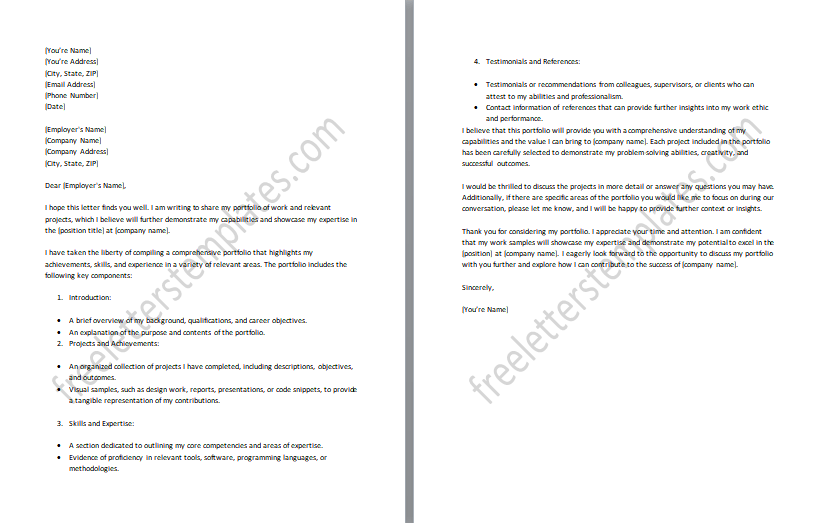
#6: Problem-Solving Analysis Letter:
Present a detailed analysis of a problem mentioned during the interview and offer potential solutions. A problem-solving analysis letter allows you to present a detailed analysis of a problem mentioned during the interview and offer potential solutions. This letter demonstrates your critical thinking abilities, problem-solving skills, and ability to contribute meaningful insights to the organization. By providing a comprehensive analysis and offering innovative solutions, you showcase your ability to tackle challenges head-on and provide value to the company. This letter further highlights your proactive approach and commitment to finding effective resolutions to complex issues.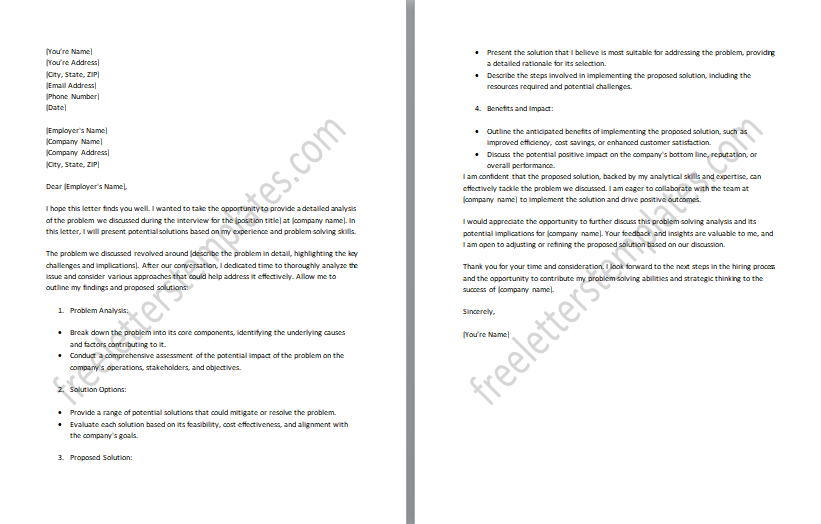
#7: Updated Certification Letter:
Sharing any recent certifications or professional development courses you have completed since the interview. I wanted to share an updated certification letter to inform you of the recent certifications and professional development courses I have completed since our interview. These additional credentials reflect my commitment to continuous learning and staying current in my field. I believe these certifications further enhance my qualifications for the position and demonstrate my dedication to professional growth and excellence. I am excited to contribute my expanded knowledge and skills to the team.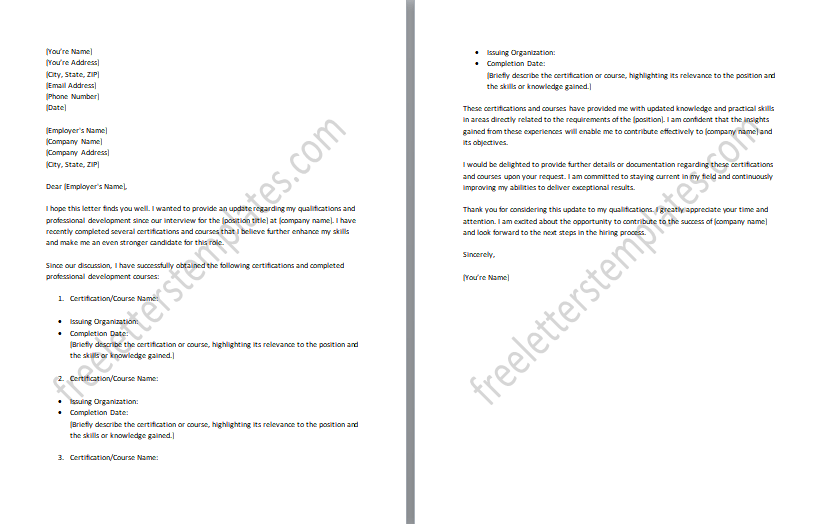
#8: Networking Referral Letter:
Requesting referrals or introductions to other professionals or organizations in your field. I am reaching out to request your assistance with networking referrals or introductions within our industry. As we discussed during the interview, I am passionate about building meaningful connections and expanding my professional network. Your expertise and extensive network make you a valuable resource, and I would greatly appreciate any introductions or referrals you could provide. By leveraging your connections, I aim to explore new opportunities, learn from experienced professionals, and contribute to the growth of our field.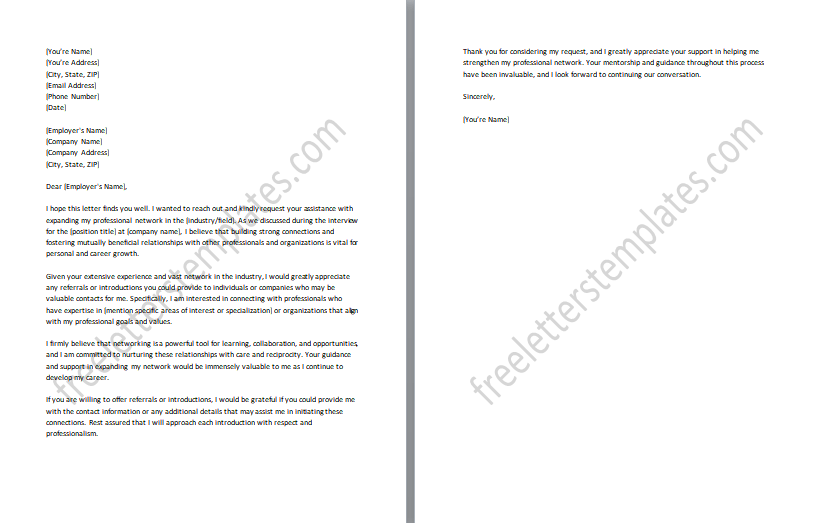
#9: Testimonial Request Letter:
Asking the interviewer or a company representative for a testimonial or recommendation. The testimonial request letter serves as a formal request to the interviewer or a company representative for a testimonial or recommendation. Its purpose is to seek their endorsement based on their firsthand experience with the candidate. By requesting a testimonial, the candidate aims to gather positive feedback that can be used to strengthen their professional reputation and credibility.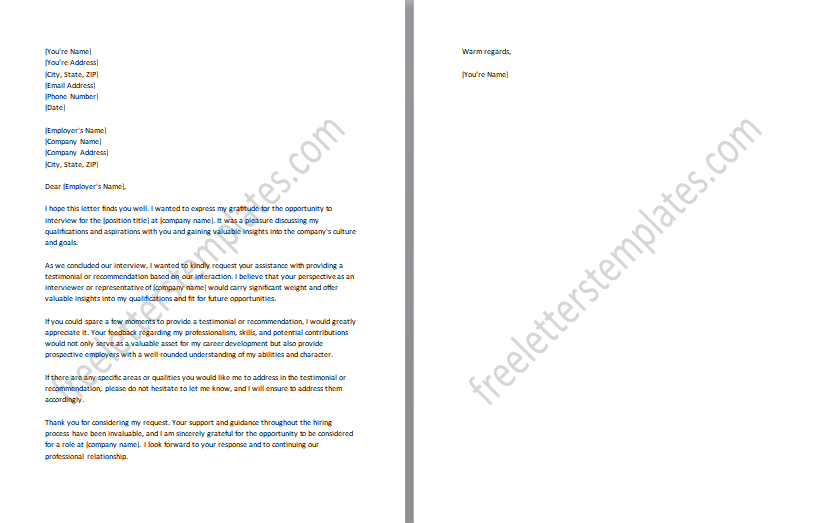
#10: Company Research Follow-up Letter:
Providing additional insights or research findings related to the company or industry discussed during the interview. The company research follow-up letter allows the candidate to provide additional insights or research findings related to the company or industry discussed during the interview. Its purpose is to demonstrate the candidate’s genuine interest and commitment to understanding the company’s needs and industry dynamics. This letter also serves to reinforce the candidate’s qualifications and align their skills with the organization’s goals, further establishing their credibility and enthusiasm for the position.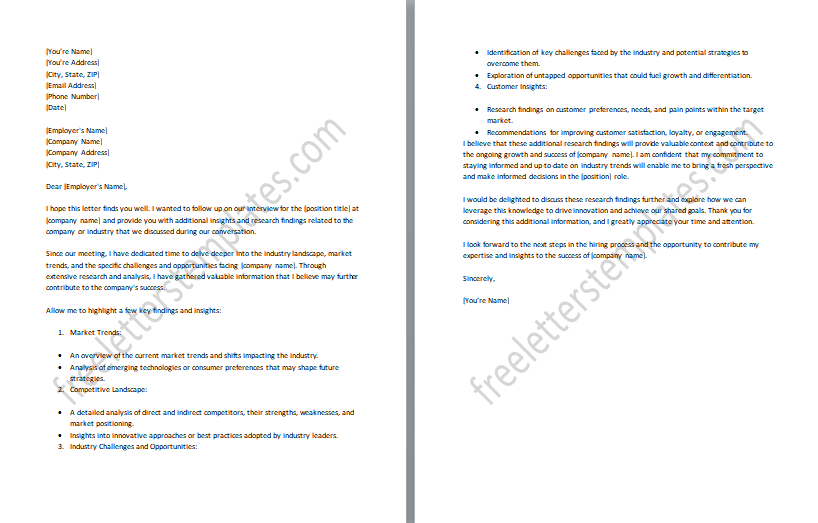
#11: Contract Negotiation Letter:
Initiating a discussion about contract terms, compensation, or benefits after receiving a job offer. A contract negotiation letter initiates discussions about contract terms, compensation, or benefits after receiving a job offer. It expresses the candidate’s interest in further discussing specific aspects of the offer and proposing adjustments to align with their needs. This formal communication aims to engage in open dialogue and reach a mutually beneficial agreement. It allows for clarifying expectations, addressing uncertainties, and establishing a solid foundation for a successful employment relationship.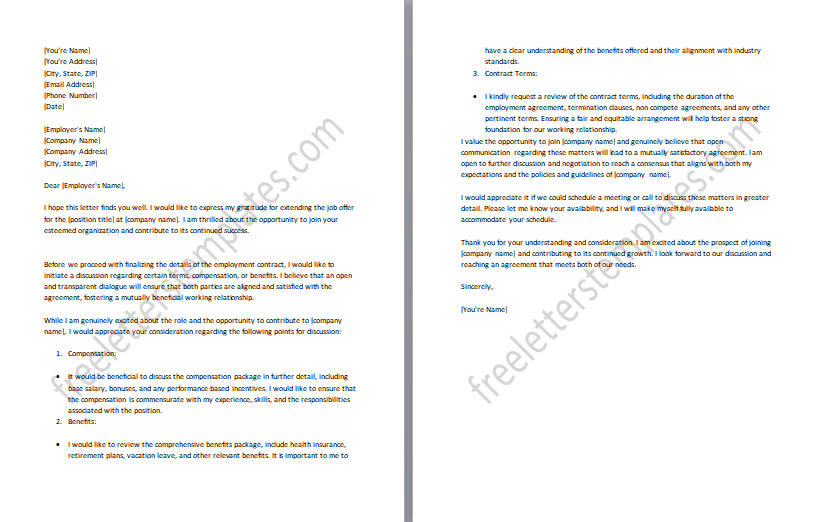
#12: Availability Confirmation Letter:
Confirm your availability for a follow-up interview or a second round of interviews. An availability confirmation letter confirms the candidate’s availability for a follow-up interview or a second round of interviews. This letter serves as a formal response to express the candidate’s readiness and willingness to proceed with the next stage of the hiring process. It confirms the dates and times proposed for the interviews and reaffirms the candidate’s interest in the position. The availability confirmation letter helps to maintain clear and effective communication, ensuring a smooth and efficient continuation of the selection process.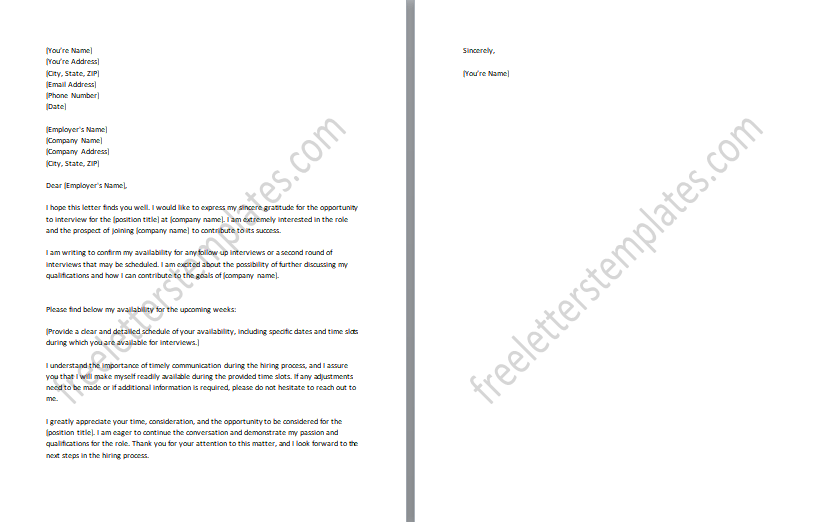
#13: Employment Timeline Inquiry Letter:
Inquiring about the timeline for hiring decisions and the next steps in the process. An employment timeline inquiry letter is a formal communication used to inquire about the timeline for hiring decisions and the next steps in the hiring process. This letter expresses the candidate’s interest in gaining clarity on the expected timeline for receiving a decision regarding the job offer. It seeks to understand the next stages of the process, such as follow-up interviews, reference checks, or background screenings. The employment timeline inquiry letter helps the candidate to stay informed, manage expectations, and plan accordingly while demonstrating their continued interest in the position.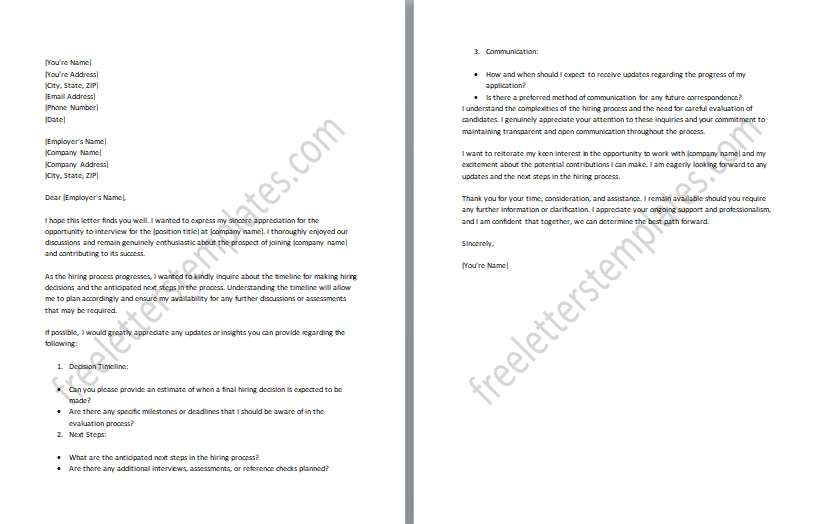
#14: Additional Question Clarification Letter:
Seeking clarification on any questions or concerns discussed during the interview. An additional question clarification letter is a formal communication used to seek clarification on any questions or concerns discussed during the interview. Its purpose is to address any uncertainties or areas that require further clarification. This letter allows the candidate to demonstrate their attention to detail, proactive approach, and commitment to understanding the role and expectations. By seeking clarification, the candidate ensures a clear understanding of the information exchanged during the interview and presents themselves as a thoughtful and engaged candidate.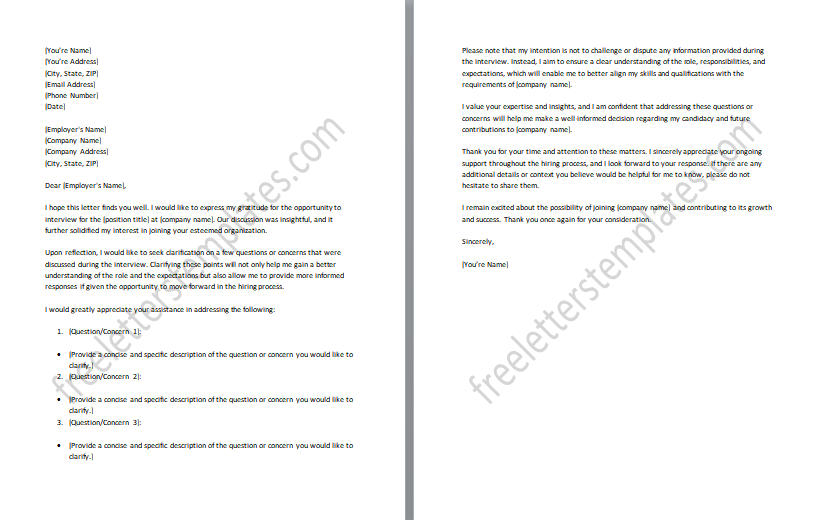
#15: Industry Insight Sharing Letter:
Sharing an article, report, or industry insight that you believe may be valuable to the interviewer or the company. An industry insight-sharing letter allows you to share an article, report, or industry insight that you believe may be valuable to the interviewer or the company. By sharing relevant and insightful content, you showcase your commitment to staying informed and your proactive approach to keeping the company up-to-date on industry trends, developments, or best practices. This letter helps to build credibility, establish yourself as a valuable resource, and foster a mutually beneficial professional relationship.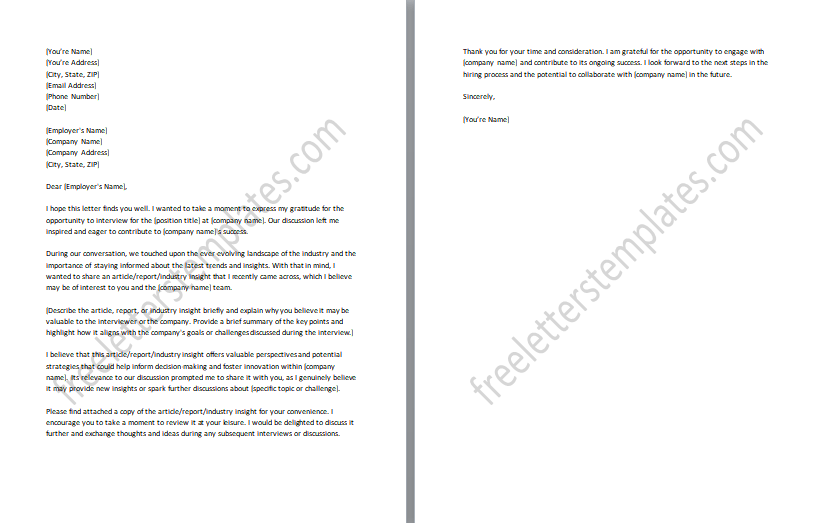
#16: Professional Association Involvement Letter:
Highlight your involvement in professional associations or industry-related organizations. A professional association involvement letter highlights your active participation and engagement in professional associations or industry-related organizations. By highlighting your involvement, such as holding leadership positions, attending conferences, or contributing to industry publications, you demonstrate your dedication to staying current, expanding your knowledge, and cultivating valuable connections. This letter reinforces your credibility, expertise, and passion for your profession, positioning you as a well-rounded and engaged professional in your field.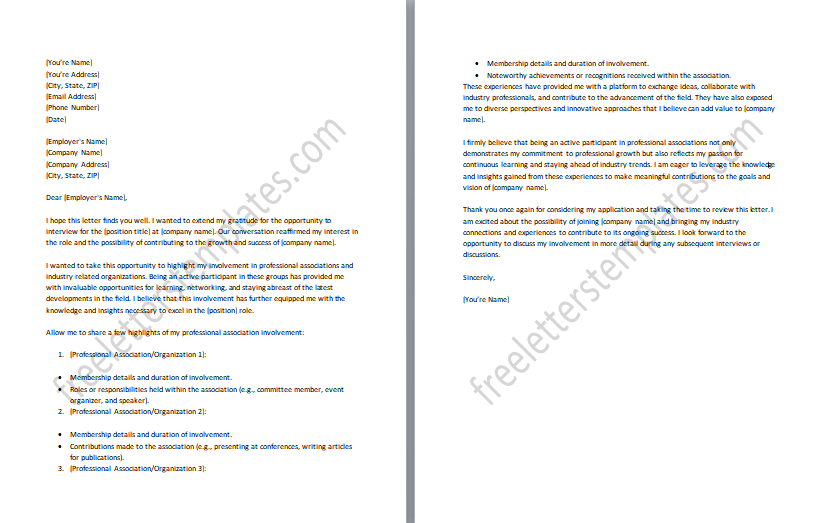
#17: Community Involvement Update Letter:
Provide an update on any community service or volunteer work you have been involved in since the interview. A community involvement update letter provides an update on any community service or volunteer work you have been involved in since the interview. This letter serves to highlight your commitment to making a positive impact beyond your professional endeavors. This letter showcases your values, empathy, and ability to make a difference, further enhancing your overall profile as a well-rounded and socially responsible individual.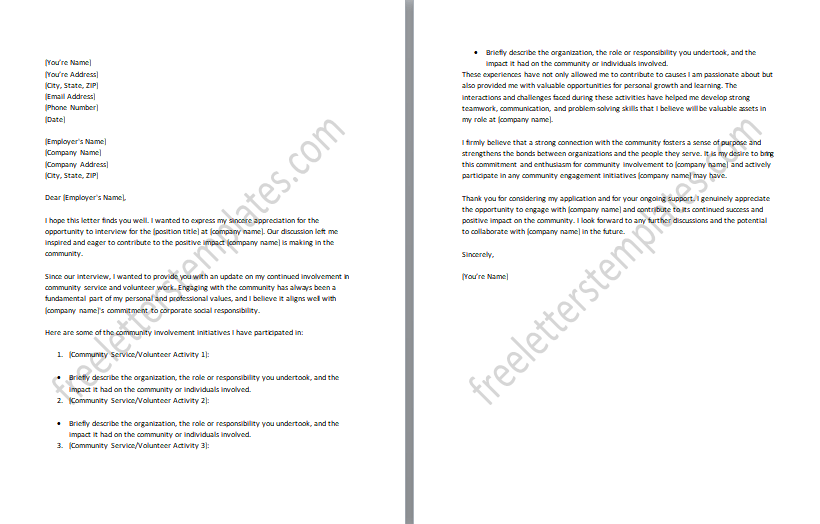
#18: Workshop or Conference Invitation Letter:
Invite the interviewer or relevant company representatives to attend a workshop or conference you will be presenting at. I am writing to extend an invitation to the interviewer or relevant company representatives to attend a workshop or conference where I will be presenting. By inviting them to attend, I aim to provide value by sharing my expertise, insights, and innovative ideas within our industry. This invitation highlights my commitment to professional growth, thought leadership, and the opportunity to network and collaborate with industry peers.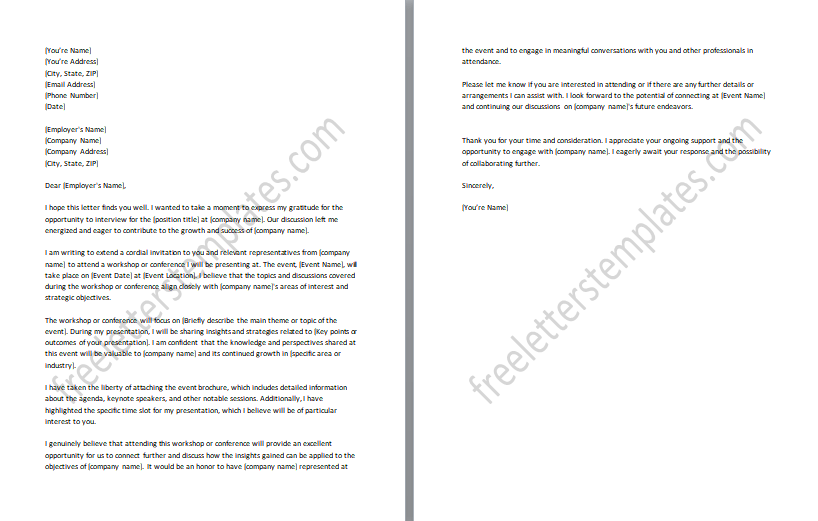
#19: Industry Trend Analysis Letter:
Offering an analysis of current industry trends and how they may impact the company or position. An industry trend analysis letter offers an analysis of current industry trends and their potential impact on the company or position. This letter serves to provide valuable insights into emerging trends, technological advancements, or market shifts that could shape the future of the industry. By offering this analysis, you showcase your expertise, strategic thinking, and ability to anticipate and adapt to changing dynamics. This letter demonstrates your commitment to staying ahead of the curve and positioning the company or position for success in a rapidly evolving landscape.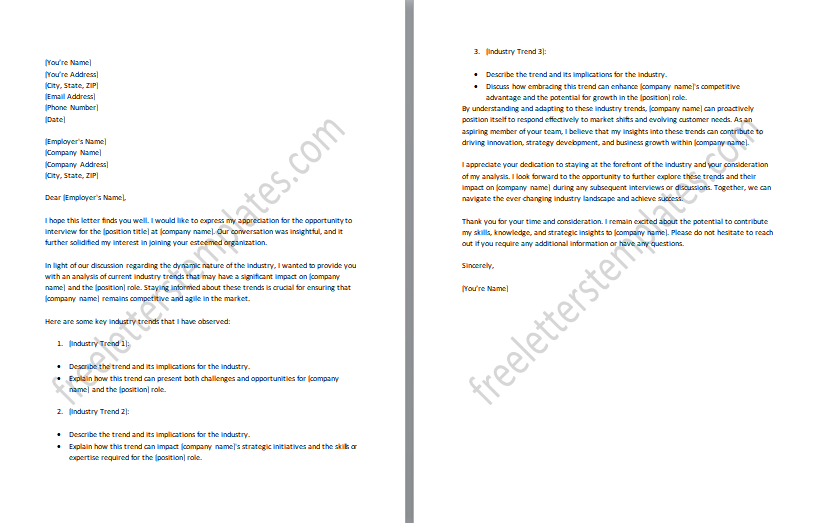
#20: Collaborative Project Proposal Letter:
Proposing a collaborative project or partnership with the company to address a specific challenge or opportunity. A collaborative project proposal letter outlines a proposal for a joint project or partnership with the company to address a specific challenge or opportunity. This letter serves to present your idea, detailing the objectives, scope, and potential benefits of the collaboration. By proposing this project, you demonstrate your proactive mindset, innovative thinking, and eagerness to contribute to the company’s success. This letter showcases your ability to identify and tackle important challenges while highlighting the value of collaboration and leveraging collective expertise for mutual growth and achievement.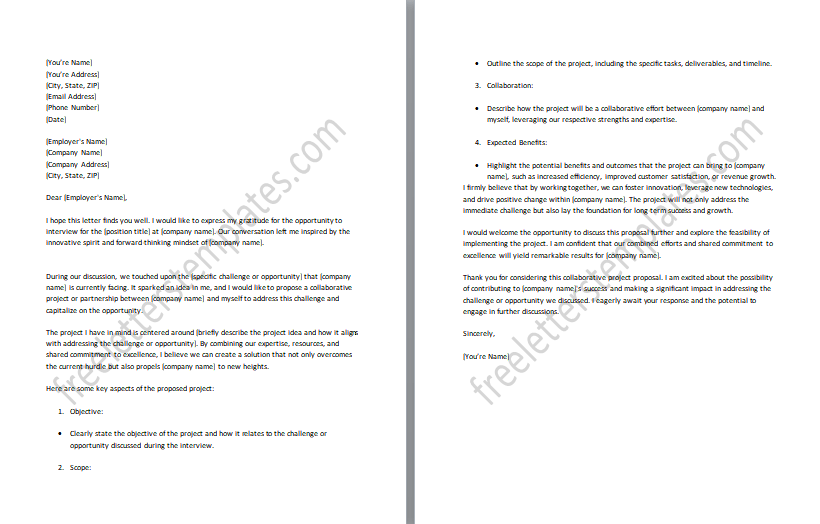
#21: Follow-up Thank You Card:
Sending a handwritten thank you note to express appreciation for the interview and show attention to detail. A follow-up thank you card is a handwritten note expressing appreciation for the interview and demonstrating attention to detail. This note serves to convey gratitude for the opportunity, reiterate your interest in the position, and acknowledge the interviewer’s time and effort. By sending a personalized and handwritten card, you showcase your professionalism, sincerity, and ability to go the extra mile. This gesture leaves a lasting impression, fostering a positive rapport and demonstrating your commitment to professionalism and thoughtful communication.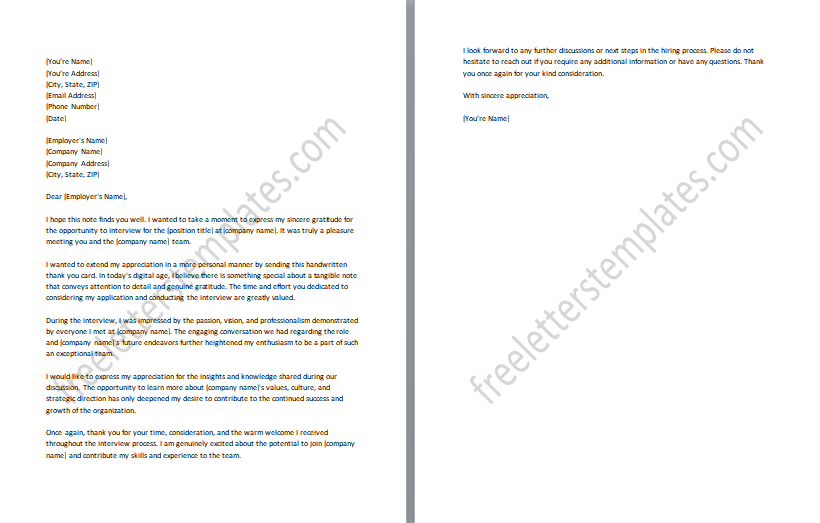
#22: Social Media Connection Request Letter:
Requesting to connect with the interviewer or company representatives on professional networking platforms like LinkedIn. A social media connection request letter is a formal communication requesting to connect with the interviewer or company representatives on professional networking platforms like LinkedIn. This letter serves to establish a digital connection and expand your professional network. By sending this request, you express your interest in maintaining a professional relationship beyond the interview process. This letter enables you to leverage the power of online networking, share relevant industry insights, and stay connected with the company’s updates and opportunities. It demonstrates your proactive approach to building and nurturing professional connections in the digital era.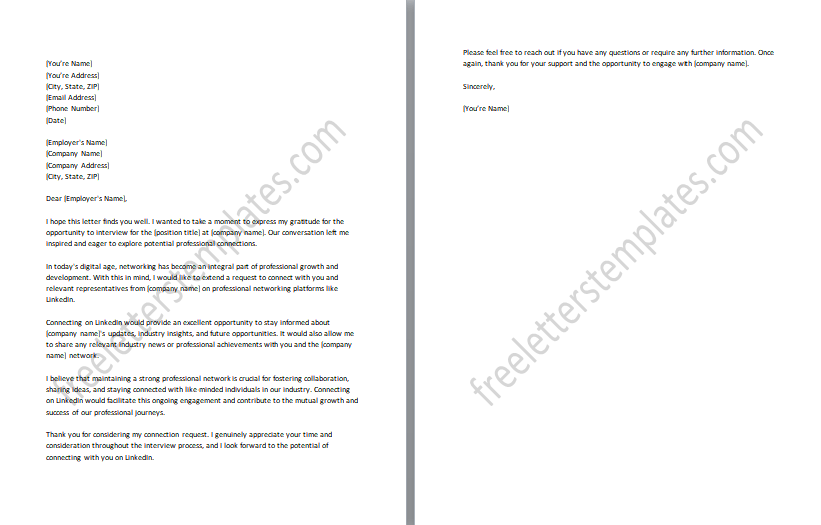
#23: Professional Development Resource Sharing Letter:
Sharing a valuable resource, such as a book, podcast, or online course, that you believe could benefit the interviewer or the company. A professional development resource sharing letter allows you to share a valuable resource, such as a book, podcast, or online course, that you believe could benefit the interviewer or the company. This letter serves as an opportunity to provide valuable knowledge and insights, showcasing your commitment to continuous learning and professional growth. By sharing this resource, you demonstrate your willingness to contribute to the development and success of the interviewer or the company, fostering a sense of collaboration and mutual growth. This letter helps to build credibility, establish yourself as a valuable resource, and strengthen professional relationships.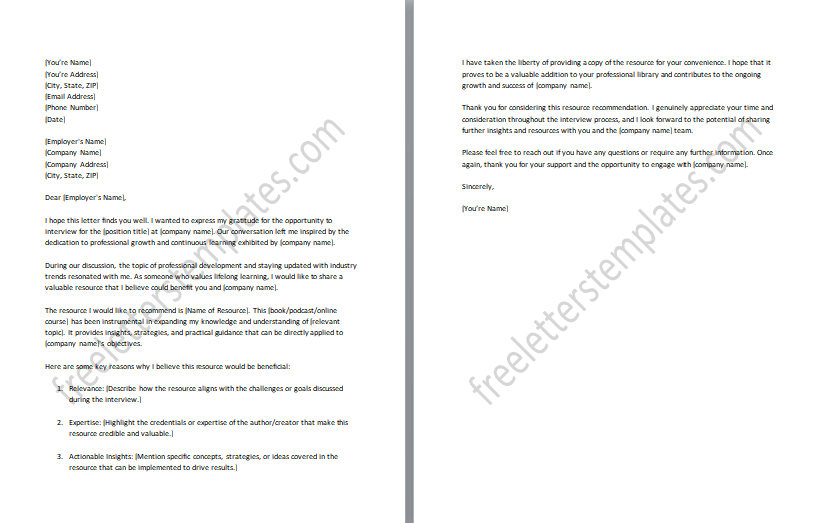
Follow-up Letter Mistakes to Avoid
- Lengthy or Rambling Content: Avoid making your follow-up letter too long or including unnecessary details. Keep it concise and focused on the key points you want to convey. Stick to relevant information and avoid going off on tangents.
- Lack of Personalization: Generic follow-up letters that lack personalization can come across as insincere or disengaged. Address specific points discussed during the interview, mention the interviewer’s name, and reference any shared experiences or insights to show your genuine interest and attentiveness.
- Grammatical and Spelling Errors: Carefully proofread your follow-up letter to eliminate any grammatical or spelling errors. Typos and mistakes can give a negative impression and undermine your professionalism. Use grammar and spell-check tools, read the letter aloud, or ask someone else to review it for you.
- Excessive Follow-up: While it’s important to express your interest, avoid excessive follow-up or repeated inquiries about the hiring decision. Respect the hiring process and timelines provided. Sending too many follow-up letters or emails can appear desperate or pushy.
- Lack of Clarity and Purpose: Ensure that the purpose of your follow-up letter is clear and well-defined. Clearly express your appreciation for the interview, reiterate your qualifications, and mention any additional information or materials you are providing. Avoid vague or ambiguous statements that may confuse the reader.
- Negativity or Criticism: Maintain a positive tone throughout your follow-up letter. Avoid criticizing the interview process, expressing frustrations, or focusing on perceived shortcomings. Instead, focus on the positive aspects of the interview and the opportunity to contribute to the company.
- Poor Formatting and Structure: Present your follow-up letter in a professional and organized manner. Use proper formatting, including paragraphs, headings, and appropriate spacing. Ensure that the letter flows logically and is easy to read. Consider using a professional email template or a well-designed letter format.
Customization and Personalization
Customization and personalization are essential when it comes to follow-up letters after job interviews. Tailoring your communication to each specific job opportunity demonstrates your genuine interest and attention to detail. Here are some points to consider when customizing and personalizing your follow-up letters:
- Reflect on the interview experience: Take time to reflect on the interview experience and the key points discussed. Think about the questions asked, the company’s values and culture, and any specific challenges or opportunities that were mentioned. This will help you craft a more targeted and relevant follow-up letter.
- Address specific topics or concerns: Use your follow-up letter as an opportunity to address any specific topics or concerns that were discussed during the interview. This could include elaborating on your qualifications or providing additional information that demonstrates your fit for the role and the company.
- Mention shared experiences or insights: If you had any shared experiences or discussions during the interview that stood out, reference them in your follow-up letter. This could be a shared passion for a particular project or a common perspective on industry trends. Showing that you were engaged and attentive during the interview helps to create a personal connection.
- Showcase understanding of company values and culture: Research the company’s values, mission, and culture, and incorporate this knowledge into your follow-up letter. Highlight how your skills, experience, and values align with those of the company. This demonstrates that you understand their organizational dynamics and can contribute to their goals.
- Personalize the salutation and closing: Address the recipient of your follow-up letter by name, and use a personalized salutation and closing. This small touch adds a personal touch and shows that you took the time to address the letter specifically to the individual or individuals involved.
- Keep the tone professional and genuine: While personalizing your follow-up letter, maintain a professional tone. Be genuine in your expressions of gratitude and interest in the opportunity. Avoid overly informal language or trying too hard to be overly familiar. Strive for a balance between professionalism and a personalized touch.
Elevate Your Job Search with Customized Follow-Up Letters
In conclusion, job interview follow-up letters play a crucial role in the post-interview process, allowing candidates to leave a lasting impression, express gratitude, and showcase their continued interest in a position. By providing a range of resources beyond just templates, this website aims to empower job seekers with valuable guidance and insights to create personalized, professional, and impactful follow-up letters. Whether it’s expressing appreciation, sharing additional information, or addressing specific concerns, these letters offer an opportunity to stand out and reinforce your qualifications. Remember, a well-crafted follow-up letter can make a significant difference in building relationships, demonstrating professionalism, and increasing your chances of securing the job you desire.